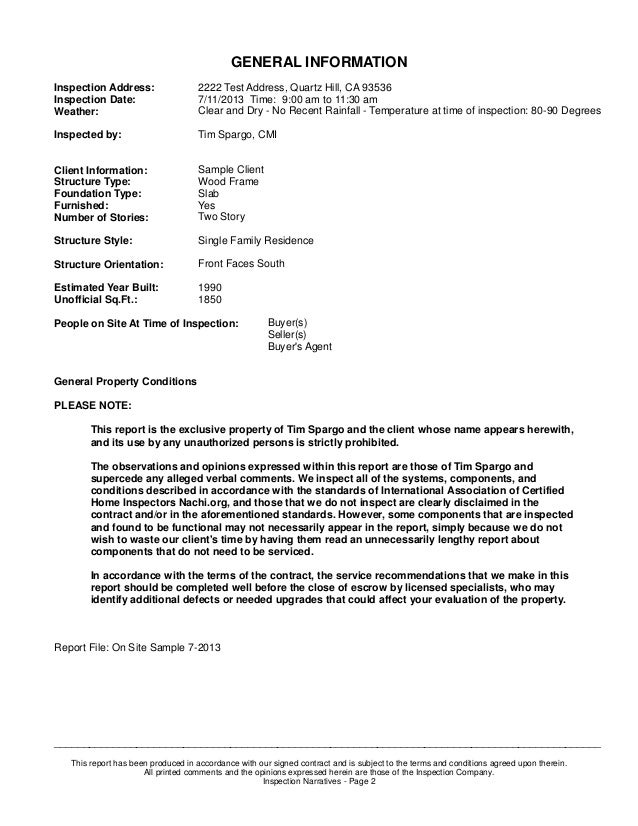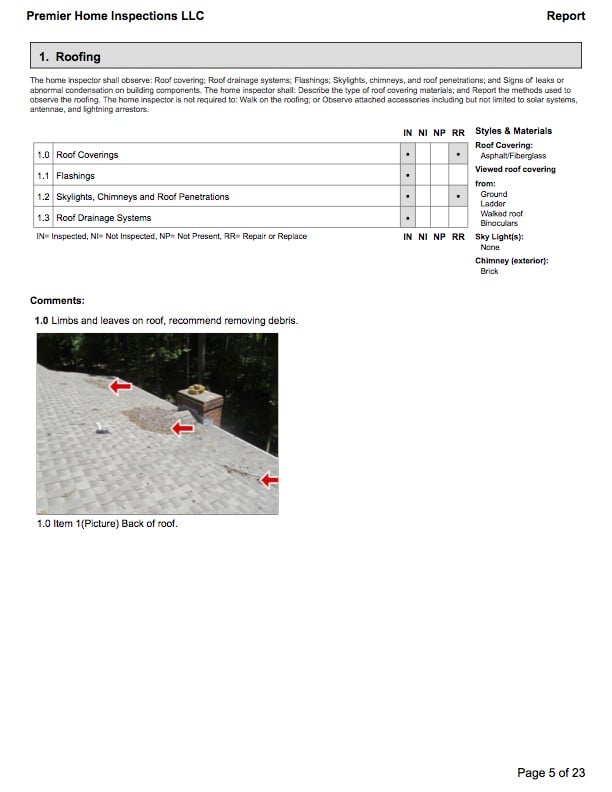Table of Content
Inside and out, top to bottom, your home’s major components, structures, and systems will be examined for performance and quality, and the resulting report will detail everything that was found. Whether you’re looking at an inspection to check a property for specific issues, there is a good chance that any reputable inspectors will be members of InterNACHI or a similar accreditation organization. Don’t expect your home inspection report to give you all the answers. However, it should contain both an explanation of any issues found and at least a cursory suggestion as to how to remedy the situation. Generally, anything on a report that an inspector considered important enough to note is worth taking seriously.

A home inspector should take several hours to complete a detailed walk-through of the home you’re looking to buy. During that time, the inspector will take notes and pictures and, if you’re tagging along, comment on what they see. Most importantly, the inspector will provide an objective opinion on the home’s condition, detached from the emotional rollercoaster you’ve been on during the home buying process. To provide enough time for additional inspections or for negotiations with the seller, you'll want to schedule a home inspection as soon as possible once you're under contract. The goal of a home inspection is to uncover issues with the home itself. Inspectors won’t tell you if you’re getting a good deal on the home or offer an opinion on the sale price.
Central Air-Conditioning System Inspection
The critical information will include recommended repairs and replacements, too. Although inspectors should have a keen eye for detail, they won’t be able to detect the unseen. That means hidden pests, asbestos, mold or other potentially hazardous substances might go unnoticed. Plumbing and electrical systems and may even poke around in the attic and basement. A home inspection is a visual assessment of a house's physical structure and mechanical systems, including the roof, ceilings, walls, floors, windows and doors.
Before closing, almost every buyer will get a home inspection to make sure there aren’t any issues with the property. While home inspectors follow the same general format to make sure every inch of the home is covered in the report, no two home inspection reports are the same. Usually, the 5-10 business days allowed in the contract includes both conducting the inspection and requesting any repairs in writing. In a buyers market, buyers sometimes have more time, but in a sellers market, they usually have to act quickly. A page showing the inspector’s professional credentials, designations, affiliations and memberships is also often included.
How much does a home inspection cost?
Every company is different, but when you work with The BrickKicker, you should expect to receive your detailed home inspection report within 24 hours if not sooner. We know that the inspection process can stir up a lot of emotions, so we work quickly to get the answers you need for peace of mind. A typical home inspection takes about three hours, after which we get to work right away creating your report. Inspections can be the only way to discover serious, possibly incredibly expensive issues with a property before investing in it.
It can also be a great opportunity to learn the inner workings of the place you will call home. The first step for a home inspection starts with a phone call, text message or email from a FEMA inspector to the applicant to schedule an appointment for an inspection. More than likely, the phone call to schedule an inspection will be from out of state. An inspector will attempt to make contact with the survivor up to three times over three different days. If inspectors cannot reach the applicant after the three attempts, their case will be closed until the applicant contacts FEMA again.
What to Expect From Your Home Inspection Report
How long does it take to get a home inspection report, and what’s included? The BrickKicker is here to guide you through what to expect and what to look for in your home inspection report. After the American Society of Home Inspectors was founded in 1976, all of that began to change. InterNACHI has created not only standards for residential home inspections and home inspection reports, but also a similar set of standards for inspections of commercial properties. Even if the seller offers to share their home inspection report or claims the house is pre-inspected, you'll want to arrange your own inspection so you can vet the inspector yourself.
An appraisal is part of the borrowing process just like checking your credit score or debt-to-income ratio. Don’t worry too much about the length of the inspector’s list of problems; instead, pay attention to the severity of the problems. After these repairs have been completed you may want to do your own walk-through inspection to make sure all the items on your list got fixed.
Should sellers make repairs before the inspection?
And the shorter that list, the better the chances of your sale closing without quibbles. Some certified home inspectors offer additional services such as radon testing and will recommend asbestos testing for homes that are suspected to be at risk. Today, most types of inspections from mold to fire door inspections are performed in accordance with one of InterNACHI’sStandards of Practice.

They will outline any potential & obvious issues, and may discuss what you should do to solve them, or whether they should be a cause for concern. They will also answer any questions that you still may have about the inspection. And not expected to check and catch issues from the inner workings of these systems. The presence of smoke, carbon-monoxide detectors, and electrical systems will be checked too.
Chances are, you recently prepared your home for showing and it’s already in close-to-perfect condition. If a shingle has slipped from the roof or a pane of glass has cracked, get them fixed in advance. Instead, pay attention to the severity of the home’s issues. A sentence or paragraph describing how serious the condition is, and the potential ramifications, answering questions such as, “Is it now stable, or will the problem continue?
In some cases, it may make sense to consult with your agent and weigh the pros and cons of the costs of repairs versus letting the buyer walk and re-listing your home as-is. If you’re selling your house on your own, then it makes sense for you to attend the home inspection. If you’re working with an agent, it’s best to have them attend on your behalf. The timeline depends on the market and the contract, but within 5-10 business days of both parties accepting the deal is standard. A home inspection contingency is an addendum to the offer contract that allows the buyer to conduct an inspection and then back out of the deal if they are unsatisfied with the findings. Once the report has been generated by the inspector, they will review it with you.
A general home inspection typically takes around two to four hours or even more, depending on the size of the home and the number of areas to be inspected. Note that the inspection can be the start of a new process, especially if there are too many major issues found in the property. Sellers will often give money back to address defects in the form of seller concessions. This gets credited to you at closing, along with other credits and debits that appear on the final settlement statement. But you might as well go for any quick wins that are available.


No comments:
Post a Comment